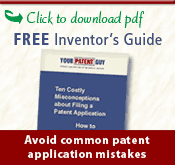This has been a question on the minds of inventors ever since the first patents were granted. For a consortium of six well-known tech companies (Apple, EMC, Ericsson, Microsoft, Sony, and RIM), “approximately 6,000 residual patent assets” of Nortel Networks Inc. are worth about three-fourths of a million dollars ($750,000) per asset, on average. Given a general yardstick that is often used, that about 3-5 patents of every 100 have any real economic value, that means that each of the 1200 “valuable” assets actually has a price tag of $3,750,000! (When citing that 3-5 number, we do mention that when a patent is valuable, it more than compensates for the 95% of the time that the patent has less economic value than desired.)
I haven’t found a copy of the specific list of residual patents (much was filed under seal due to asserted sensitive commercial information concerning Nortel licenses) but a quick search of US patents and published applications reveals 4,173 issued US patents, and 1225 published applications (patentability still TBD and I did not check for duplications). WIPO reveals 1205 PCT applications and ESPACENET shows over 12,306 results listing “Nortel” as applicant in 80+ countries. That is a lot to sift through.
For the majority of patents, the cost to prepare and file an application, prosecute it through the various patent offices, and to maintain the patent, is a small fraction of these numbers. It is when the patents are relevant to access to valuable markets, through licensing and litigation, that numbers like this begin to appear. Patent litigation can easily be tens of millions of dollars. If we set a cost of $25 million per lawsuit, the price of these assets comes out to 180 complete lawsuits, 30 per member of the consortium. That is for litigation going through the entire process. (Note, the majority of disputes stop short of trial.) This is, unfortunately, a defensive way to look at the world . $4.5 billion could have resulted in some beneficial innovation and useful products through additional R&D by these companies (with the added benefit of more work for patent prosecutors).
We’ll look at the specifics of what these patent assets actually address later, but a quick look at about 1,000 Nortel US patents issued in the last 5 years show a significant number issued in US class 370 (Multiplex Communications) and 709 (Electrical Computers and Digital Processing Systems (the relevant subclasses concern multicomputer data transfer). These do not appear at first blush to be closely related to the types of technologies that we associate with the “Consortium” members. As I often remind readers, the value of a patent is in the claims, particularly the independent claims. There are 3,505 independent claims in these patents that would need to be reviewed and analyzed before we would have any idea whether any of these patents have real value in the patent sense.
Maybe there are enough jewels in that portfolio justifying such a cost. Given that I write applications that mature into what my clients and I hope are valuable patents, it is good to see what a portfolio can look like in the abstract sense. But these are numbers and considerations for commercial activities and entities other than the small business and solo inventor. There have been some patents that I’ve written and prosecuted that, along with vision by management and some skillful litigation, have resulted in patents at least as valuable as these. It is a process and I suspect that for several reasons no one at Nortel had any inkling of this day when Nortel had its first patent application drafted and filed.
YPG









Notice: Undefined property: thesis_comments::$comments in /home/k13x1mpx8le9/public_html/ypg/wp-content/themes/thesis_185/lib/classes/comments.php on line 41
{ 0 comments… add one now }